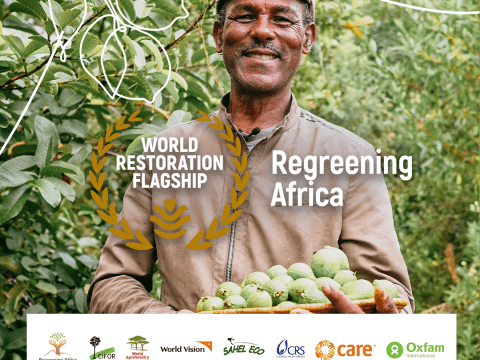EU funded Regreening Africa Awarded UN World Restoration Flagship!

The revolutionary technique to tackle both poverty and climate change, Farmer Managed Natural Regeneration (FMNR), has been given a major stamp of approval by the UN World Restoration Flagships program.
The European Union-funded Regreening Africa initiative – which includes FMNR and of which World Vision is a key implementing partner – has been named as one of seven UN World Restoration Flagships.
As part of the UN Decade on Ecosystem Restoration, the World Restoration Flagship awards recognise initiatives following global commitments to restore one billion hectares. Regreening Africa is one of the most successful large-scale and long-term models of ecosystem restoration, embodying the 10 Restoration Principles of the UN Decade.
FMNR is a low-cost approach that is up to 36 times cheaper than planting a tree and can be replicated across communities, for as little as $50 per hectare. It is a quick and easy process for degraded land restoration which involves regenerating trees from stumps that are still alive or managing new trees growing from wild seedlings through pruning.
World Vision Australia helped to design and steer the Regreening Africa project and provided support to the implementing World Vision offices. World Vision has been instrumental in delivering and supporting the spread of FMNR, a major contribution to the success of the project.
World Vision Australia CEO Daniel Wordsworth said, “FMNR as part of Regreening Africa is a huge success story and has played a vital role in restoring stability to communities in regions where healthy lands are integral to their wellbeing. We appreciate the European Commission, CIFOR-ICRAF and the wide range of partners who all played a part in reaching this significant milestone."
“I’m also proud of World Vision Australia’s role in the project demonstrating our experience and capability to the world by successfully delivering FMNR on a large scale to reverse land degradation, improve livelihoods and resilience to climate change.”
The European Union granted €$18 million for the first phase of Regreening Africa which was carried out from September 2017 to March 2023 across eight countries in sub-Saharan Africa. World Vision led the implementation of Regreening Africa in Kenya, Rwanda, Somaliland, Senegal, Ghana, and Niger and supported in Ethiopia and Mali.
Note to editor:
The Regreening Africa initiative is co-led by the Center for International Forestry Research and World Agroforestry (CIFOR-ICRAF) with a range of partners including World Vision and is expected to bring five million hectares under restoration by 2030, boosting biodiversity and supporting local communities.
Regreening Africa phase one reached over 607,000 households with regreening knowledge and skills, and a total of nearly 161,000 households confirming adoption of new regreening practices as a result of the project. It also contributed to the regreening of over 350,000 hectares with an average increase in the number of trees from 43 trees per hectare at the start of the project to 120 trees per hectare at the end of phase one. As a result, more than 900 households were able to start earning additional income from trees while the overall percentage of households earning income from the sale of tree-related products increased from 8 to 20 percent, particularly in Ghana and Mali.